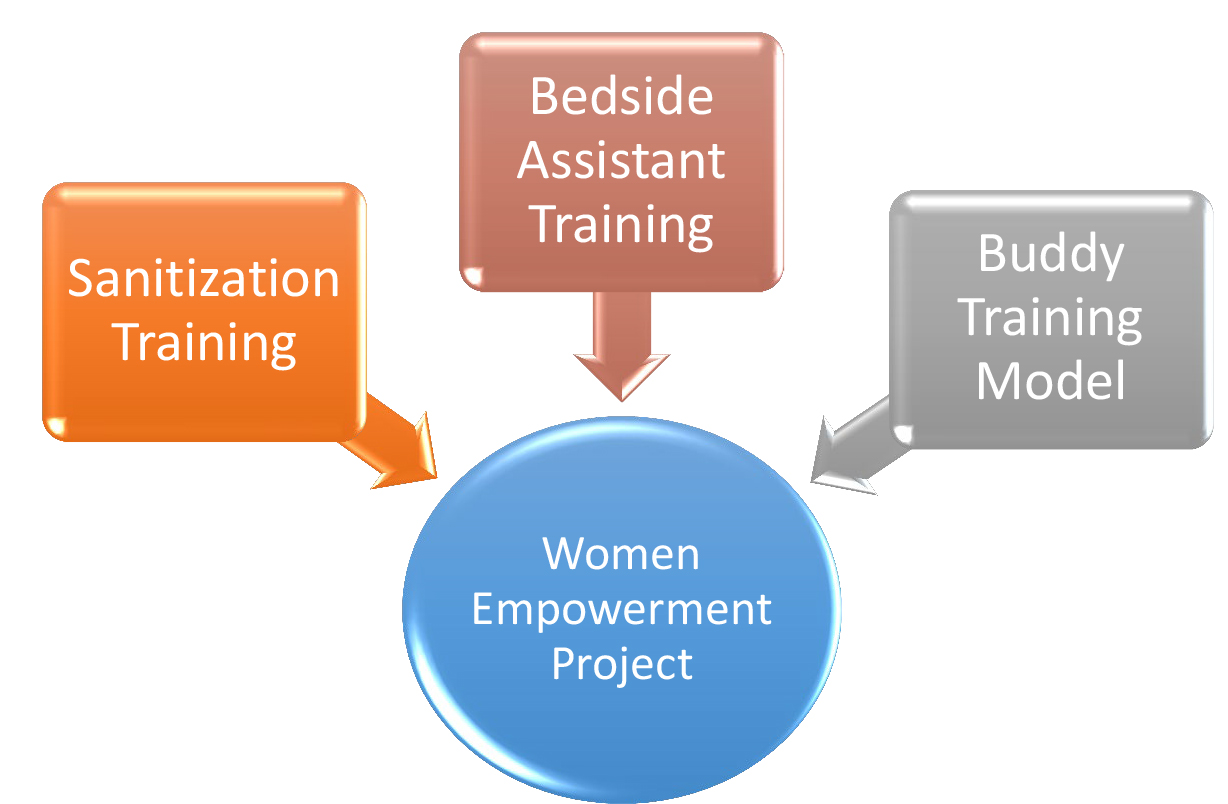|
Covid Challenge also offers
New Opportunities
in Job Training for Women
During
the first Covid-19 wave, rising unemployment became the most pressing
economic problem, affecting mostly the informal economy and poorer
households. State-imposed local restrictions had an equally catastrophic
effect on small businesses and their staff which led to the loss of
employment and income for poor households.
 The Society for Development Alternatives was conducting a Women
Empowerment Project in Rajasthan and Chhattisgarh with Fullerton India
Credit Company Limited to empower women via job training and livelihood
connections, but the implementation activities had to be halted for some
time. Many young people and women lost their employment because of the
pandemic outbreak. The Society for Development Alternatives was conducting a Women
Empowerment Project in Rajasthan and Chhattisgarh with Fullerton India
Credit Company Limited to empower women via job training and livelihood
connections, but the implementation activities had to be halted for some
time. Many young people and women lost their employment because of the
pandemic outbreak.
Development Alternatives then implemented measures that contributed to
both the management of Covid-19 and the development of skills in order
to increase the income of the target audience. Three key modifications
were made in the execution and training of the programme: Sanitisation
Training, Bedside Assistant Training and the Buddy Training Model.
1. Sanitisation Training: It was noted that as sanitation has become a
vital element in our lives, many connected job possibilities were
available as the unlock encouraged individuals to maintain their
offices, houses, automobiles and their environment safe and secured from
the virus. For this purpose, a ten-day training was conducted on the
knowledge sharing and creating well-informed sanitised workers, with
special emphasis on the symptoms of Covid-19, transmission and
prevention techniques, sanitising procedures, hygiene practices and
first-aid assistance. Training was conducted by a certified nurse and a
trained facilitator. Market assessment and meetings with local offices,
restaurant and outlets to have their facilities sanitised by skilled
sanitation workers resulted in the creation of jobs and the fulfilment
of the safety requirements in and around the communities. All the
trained women were also given hand-holding for a month as part of the
programme. Counseling and materials were provided, including a spray
machine, disinfectant and a PPE kit.
2. Bedside Assistant Training: DA undertook preparations to enter te
healthcare sector with stimulated discussion on the need for accelerated
innovation in online learning and the delivery of skills training for a
Bedside Assistant. In Chhattisgarh, 59 people, including 50 women, were
trained for the role of Bedside Assistant as part of the Women
Empowerment Project. The training was based on the care of individuals,
particularly bedridden patients and the elderly. Aside from the normal
responsibilities, a Bedside Assistant distributes medication, maintains
patient records, and controls medical equipment. The programme was held
in collaboration with the Vishwas Social Welfare Society. In May 2020,
50 of 59 trainees would be employed in private hospitals and Covid care
centres across Chhattisgarh, receiving an average monthly salary of Rs.
8,431.
3. Buddy Model for Sewing Machine Operatorís Training: The notion of
buddy training was created and launched because the centres could not be
operational due to the pandemic. Under this concept, three community
women were selected and recruited as facilitators in three distinct
places in Jaipur with right qualification and required understanding of
sewing and tailoring skills. These facilitators were primarily
responsible for training other women in the community on the SMO course
in their respective locations. A total of 55 women in the community have
been trained in the three areas, Hassanpura, Van Vihar and Jagatpura in
Jaipur, by these facilitators. The field staff performed regular
inspections at all three locations to verify attendance and quality of
training. The trainers and the trainees also took steps to avoid
Covid-19 transmission.
These efforts are a step toward the establishment of equitable and
informed communities where women make their own socio-economic choices
with newly gained confidence as a result of participation in livelihood
activity and increased economic levels. Thus, it leads to more mobility,
increased decision-making capability, and increased self-confidence in
women. ■
Ekta Kashyap
ekta@devalt.org
Back to Contents
|
 The Society for Development Alternatives was conducting a Women
Empowerment Project in Rajasthan and Chhattisgarh with Fullerton India
Credit Company Limited to empower women via job training and livelihood
connections, but the implementation activities had to be halted for some
time. Many young people and women lost their employment because of the
pandemic outbreak.
The Society for Development Alternatives was conducting a Women
Empowerment Project in Rajasthan and Chhattisgarh with Fullerton India
Credit Company Limited to empower women via job training and livelihood
connections, but the implementation activities had to be halted for some
time. Many young people and women lost their employment because of the
pandemic outbreak.